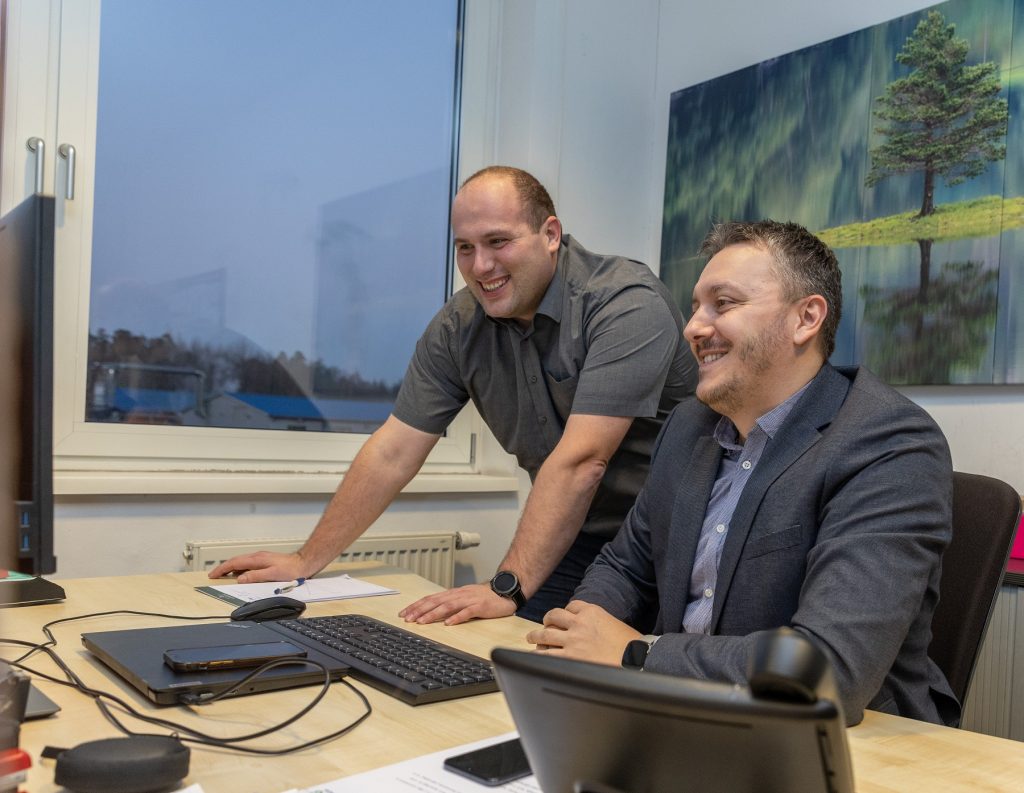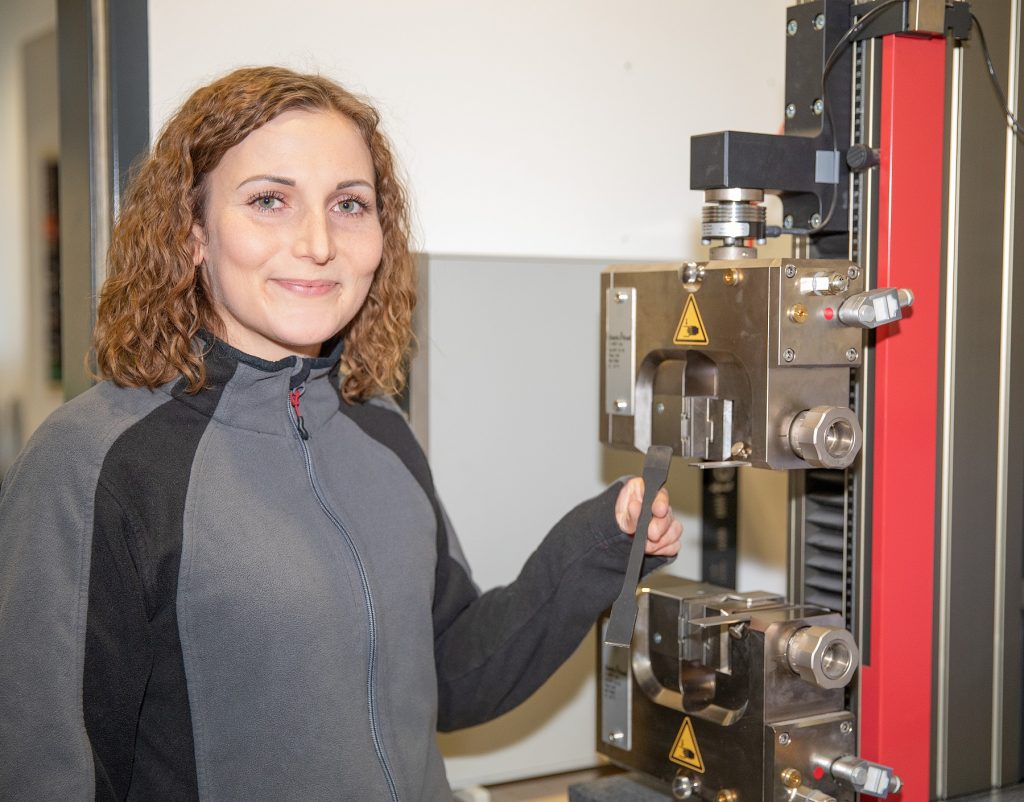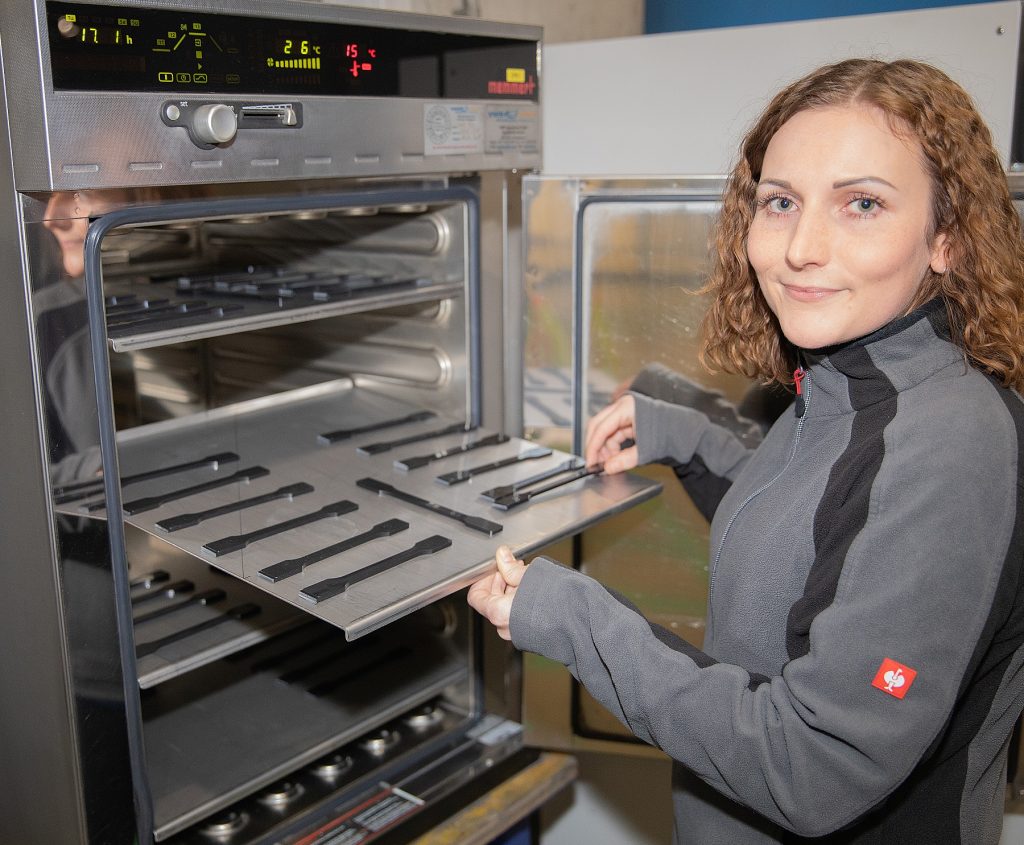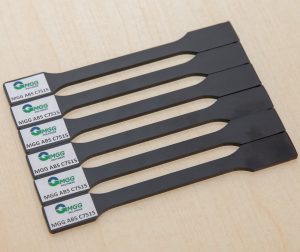After extensive research and development work, the innovation team at MGG Polymers has succeeded in making their recycled ABS plastic even more resistant to the constant influence of heat. In a project lasting around two years – together with the renowned testing and certification institute Underwriters Laboratories (UL) – the mechanical RTI values (Relative Thermal Index) in the „Impact“ category were increased to 80 degrees Celsius and in the „Tensile Strength“ category to 95 degrees Celsius. This once again makes MGG Polymers the European leader when it comes to the quality of plastic recycled from old electrical appliances.

Quality manager Philipp Felber (left) developed and accompanied the project „Better RTI values“ with UL, which lasted about two years. He and Darko Huskic are pleased that the lengthy UL certification process for the ABS material has now been completed.
In 2021, a well-known manufacturer of coffee machines and regular customer approached the sales team at MGG Polymers with a big request: „The question was whether it would not be possible for the recycled ABS plastic they have been using for years to be even more heat-resistant in the future and to have a higher RTI value,“ reports Darko Huskic, the sales professional responsible for the DACH and CEE regions at MGG Polymers. His colleague Jose Maria Barraca adds: „At that time, other customers started asking similar questions. This is because the trend in the telecommunications market is for manufacturers to develop smaller and more powerful products. This means that the plastic housing is closer to the heat source during the product’s lifetime. Therefore, it is crucial that we should achieve this important step according to the official UL standard, which is the most recognised among electronics manufacturers.“
The goal: increase the mechanical RTI values for ABS!

The tensile tests in the MGG Polymers laboratory were used to find out in advance how well the RTI values could be improved.
The task was thus clearly defined: The RTI values of the ABS plastic produced had to be increased – from a long-term perspective. Therefore, Philipp Felber, the „Head of Quality and Environmental Management“ at MGG Polymers, developed a concept and started the project „RTI Optimisation“. The relative thermal index is – as one might say colloquially – about the ageing resistance of a plastic. „Basically, every plastic reduces or loses its properties over time due to certain environmental influences. Plastics from old electrical appliances, as we use them, are affected by environmental influences but also by general usage influences such as mechanical or thermal stress. Everyone knows this from home: plastic parts that are several years old sometimes become brittle,“ Felber explains.
The RTI values quantify these plastic properties and thus make the materials comparable. The RTI is given in three categories: The electrical property, the impact property (Impact) and the tensile property (Tensile Strength). In order to improve the RTI values, quality manager Philipp Felber and his team started to develop different compound formulations (ABS mixtures with different numbers and amounts of additives). „Our products have always had an extremely high PCR (post consumer recycled) content. In order to improve the RTI values, we therefore wanted to make changes to the added additives as sparingly as possible. For us and our customers, the mechanical values were in the foreground. We tweaked our ABS formulation, so to speak, until we achieved good results in in-house tests.“
10,000 hours of testing at UL

In the course of the internal test series, Isabella Mayerhofer from the MGG Polymers laboratory equipped the oven in order to heat the test bars accordingly and thus simulate the loss of properties of the test material.
After about six months of testing in MGG Polymers‘ laboratories, the collaboration with the renowned Underwriters Laboratories (UL) institute in Germany began. A total of around 800 test rods made of the new ABS material were subjected to a 10,000-hour long-term study there – that’s roughly 416 days or one and a half years, as Felber explains: „Even if you can simulate and extrapolate certain things, it is necessary to expose the test material to high temperatures for a correspondingly long time. You simply cannot accelerate the reaction of the polymers. Physics remains physics.“ The test rods were therefore heated to four different test temperatures in several ovens, and at certain intervals the UL experts took several rods and subjected them to impact and tensile tests. These test series were designed to simulate not only thermal ageing, but also the use of the material.

Under the abbreviation „MGG ABS C7515“ MGG Polymers offers the now improved ABS plastic with RTI values of 80 degrees Celsius (impact) and 95 degrees Celsius (tensile) on the market.
At the end of the two-year project phase, everyone involved was more than happy when the desired RTI target values were exceeded. „Our customers‘ desired target was around 75 degrees Celsius, but we achieved 80 degrees for the RTI-Impact and 95 degrees for the RTI- Zugkraft,“ says a delighted Darko Huskic, who can now add another product to the spectrum of his product range. „Of course, this new ABS is not only ideal for coffee machine producers, but can also be used especially well in the field of electrical appliances. Let’s think of a WLAN router, for example: they are getting smaller and smaller and have more and more power, so temperature resistance is naturally an important issue. But we will also continue to offer our previous ABS, because RTI values of 60 degrees are sufficient for many applications.“ And Chema Barraca also confirms how important further development is for a sustainable circular economy: „Our sales are mainly concentrated on the most important OEMs in the electronics sector. For example, manufacturers of coffee machines and telecommunications equipment in particular are asking whether our material can meet this standard.“
At the end of the day, it’s about reducing CO2
For Darko Huskic, the main focus is on sustainability: „In the past, recycled plastics were used mainly because they were cheap. There were a few visionaries who had the environmental idea in mind, but the primary buying motive was price. But the world has changed. We live in new times where true sustainability counts. MGG Polymers realised long ago how important a sustainable circular economy and high recycling rates are. It is tremendous fun and an absolutely meaningful activity to be a part of this mission. With our new ABS product with high RTI values, we can meet new demands from our existing and future customers and make our world a little more sustainable! Freely according to our motto: It’s about Co2.“
